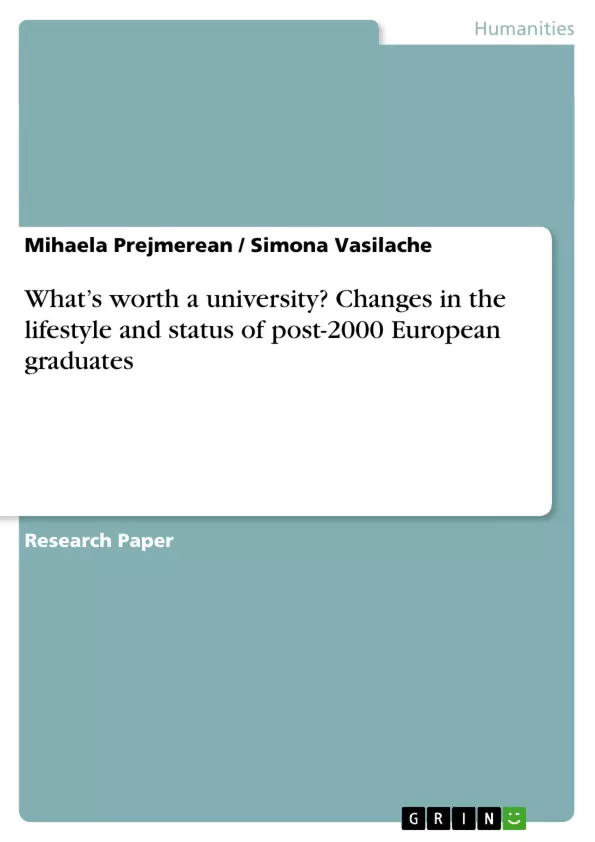The paper is structured in two main parts: the first one comprises a literature review on the occurrences of lifestyle in literature, on samples of academic publications. The second one is dedicated to tracing the proposed concept of lifestyle calibration in a sub-sample of the European Social Survey, round 2, composed of young European graduates under 35. The H0 of the study states that the groups exhibiting a good lifestyle calibration are likely to reach high levels of life satisfaction, which is not valid for groups with wrongly calibrated lifestyles. The results of the research have shown the existence of two distinct population, in the sub-sample, which we referred to as pragmatic lifestyle and rhetoric lifestyle. The pragmatic lifestyle group has a good lifestyle calibration and, confirming H0, a high level of life satisfaction, which we recorded as a lifestyle estimator, while individuals falling into the second category have wrongly calibrated lifestyles and low levels of life satisfaction. These two groups are further divided into two other clusters, per lifestyle group: graduates with a pragmatic lifestyle can be either missionaries or skeptics, while graduates with a rhetoric lifestyle are either chameleons or misanthropes. This final systematizing of the groups, preparing the ground for a cross-national comparison between the various categories of graduates, resulted from multi-cluster analysis, probit regression and log-linear models employed on the data samples. The conclusions support the diversity of lifestyles in the population of young European graduates, which still allows for an operational systematizing. The lifestyle function resulting from the study enlarges and enriches the perspectives based exclusively on time allocation models, by introducing, in the form of the lifestyle calibration concept, functions based on a system of matrices including choices, personal values, and behaviours. The complexity of the model is, thus, increased, turning it into a more appropriate estimator of a concept which has undergone, in the last years, definitions inflation, becoming a fuzzy, difficult to standardize variable.
Inhaltsverzeichnis (Table of Contents)
- 1. Literature Focus on Lifestyle. A 2000-2007 Content Analysis
- 1.1. Introduction
- 1.2. Methodology
- 1.3. Results
- 1.4. Conclusions
- 2. Conceptual approach
- 3. Research design and methods
- 3.1. Data
- 3.2. Concept measurement
- 3.2.1 Dependent variables
- 3.2.2. Independent variables
- 3.3. Multiple regression model and data analysis
- 3.4. Variables validity
- 4. Results
- 5. Conclusions
Zielsetzung und Themenschwerpunkte (Objectives and Key Themes)
This research paper explores the evolution of lifestyles and the status of European graduates born after the year 2000. The study investigates how changing societal and economic conditions have impacted the way these young graduates approach their lives, focusing on the concept of "lifestyle calibration." This concept examines the alignment between personal values, choices, and behaviors, aiming to understand its influence on overall life satisfaction.
- Lifestyle calibration and its impact on life satisfaction.
- The diversity of lifestyles among young European graduates.
- The role of personal values and behaviors in shaping lifestyle choices.
- The influence of societal and economic changes on lifestyle trends.
- The emergence of distinct lifestyle groups and their characteristics.
Zusammenfassung der Kapitel (Chapter Summaries)
- Chapter 1: This chapter examines the prominence of lifestyle as a research topic in the academic literature from 2000 to 2007. It analyzes the frequency and focus of research publications related to lifestyle in Europe, highlighting the emergence of new trends and challenges for young graduates.
- Chapter 2: This chapter delves into the conceptual framework of "lifestyle calibration," providing a theoretical foundation for understanding the relationship between personal values, choices, and behaviors in shaping overall life satisfaction.
- Chapter 3: This chapter outlines the research design and methods employed in the study. It describes the data source, the measurement of key variables, and the statistical techniques utilized to analyze the relationship between lifestyle calibration and life satisfaction among young European graduates.
Schlüsselwörter (Keywords)
The primary focus of this research is on understanding the concept of lifestyle calibration, its relationship to life satisfaction, and its manifestation in the lives of young European graduates. Key terms include lifestyle calibration, personal values, behaviors, life satisfaction, pragmatic lifestyle, rhetoric lifestyle, and the European Social Survey.
Frequently Asked Questions
What is "lifestyle calibration"?
Lifestyle calibration is a concept that examines the alignment between a person's choices, personal values, and behaviors, and how this alignment affects life satisfaction.
What are the two main lifestyle types identified in the study?
The study identifies a "pragmatic lifestyle" (well-calibrated, high satisfaction) and a "rhetoric lifestyle" (wrongly calibrated, low satisfaction).
Which four clusters of European graduates are described?
Graduates are categorized into missionaries, skeptics (pragmatic group), or chameleons and misanthropes (rhetoric group).
How does lifestyle calibration impact life satisfaction?
The research validates that groups with good lifestyle calibration are significantly more likely to reach high levels of life satisfaction.
What data source was used for this research?
The study used a sub-sample of the European Social Survey (Round 2), focusing on young European graduates under 35.
- Quote paper
- Mihaela Prejmerean (Author), Simona Vasilache (Author), 2008, What’s worth a university? Changes in the lifestyle and status of post-2000 European graduates, Munich, GRIN Verlag, https://www.grin.com/document/91731



